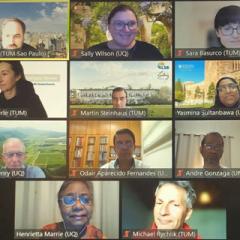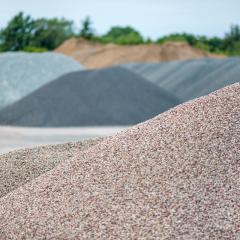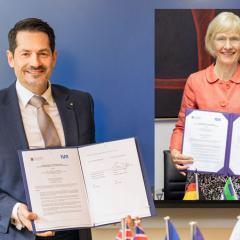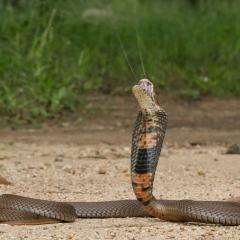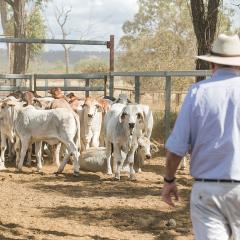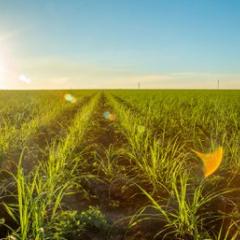Strategic allies
UQ is developing a strong presence in Brazil at the turning point of the country's rapid growth and expansion into the global economy. Through deepening engagement with selected partners – including mining giant Vale and the São Paulo State University (UNESP) – research collaboration is addressing the key challenges of our time, and working towards a safer, healthier, and more sustainable future.
Fast facts
58
Brazilian students enrolled at UQ
336
Brazil-UQ co-publications
27
academic staff born in Brazil
4
research project collaborations
810
alumni in Brazil
11
agreements with 7 official partners
Fast facts show full year 2023 data.
Research
Co-publications
Brazil and UQ have partnered on 1069 co-publications in the past 5 years, with key research areas including Astronomy & Astrophysics, Environmental Sciences, and Ecology. UQ's top co-publishing partners for this period are the Universidade de São Paulo, Universidade Estadual Paulista, Universidade Federal de Minas Gerais.
Research collaborations
In the past 5 years, UQ has collaborated with 11 Brazilian institutions on 20 research projects. Key collaborators include the University of São Paulo, São Paulo State University, and Federal University of Rio Grande do Sul.
Research funding
Brazilian organisations, including FAPESP, Vale SA, and Petrobras SA, have contributed A$1,688,739 towards 21 research projects in the past 5 years.
Collaboration in action
Ethanol fuels expansion of Brazil's farming land
A UQ-led study has revealed that future demand for ethanol biofuel could potentially expand sugarcane farming land in Brazil by five million hectares by 2030. The study published in Energy Policy was a collaboration between UQ, the International Institute for Applied System Analysis (IIASA - Austria) and the National Institute for Spatial Research (INPE - Brazil). UQ School of Earth and Environmental Sciences researcher Milton Aurelio Uba de Andrade Junior said that because Brazil produced ethanol from sugarcane, future biofuel demand would directly impact land use. “Our study has modelled scenarios forecasting future ethanol demand based on different trajectories for gross domestic product, population growth, fuel prices, blending policies, fleet composition and efficiency gains,” he said.
UQ Zika detection breakthrough a potential lifesaver
Findings from a study led by Dr Sikulu-Lord in partnership with researchers from Fiocruz, Brazil and published by the journal Science Advances, indicate that a rapid and non-invasive technique based on infrared light can identify Zika infected mosquitoes 18 times faster and 110 times cheaper than existing molecular techniques. The tool can assist authorities in the rapid identification of hotspots to reduce future outbreaks caused by mosquitoes.
Genetic link between cattle temperament and autism
A strong association between the genes influencing cattle temperament and autism in humans has been discovered by UQ researchers in collaboration with the beef industry and international collaborators from Ireland and São Paulo State University in Brazil. It’s the first time whole genome sequencing has been used to analyse temperament in beef cattle. Researchers looked at 28 million data points per animal on the 9000 cattle with temperament records in the initial study, and then validated the results in over 80,000 cattle from Ireland. UQ genomic expert Professor Ben Hayes said the research by his interdisciplinary team headed by Dr Roy Costilla could lead to improved animal welfare and meat quality.
Going to the dark side
UQ’s School of Mathematics and Physics Professor Tamara Davis AM collaborates with São Paulo State University physics Professor Rogério Rosenfeld on the large-scale project, the Dark Energy Survey. To date, almost 500 people across five continents are involved on the project, which is mapping hundreds of millions of galaxies, detecting thousands of supernovae, and finding patterns of cosmic structure that will reveal the nature of dark energy. Her accolades include the L'Oréal Women in Science Fellowship for Australia, the Australian Institute of Physics Women in Physics Lectureship, the Australian Academy of Science's Nancy Millis Medal for outstanding female leadership in science, and an Australian Research Council Laureate Fellowship among others.
Student mobility
Wildlife rescue and rehabilitation
In 2016 and 2017, UQ veterinary science students travelled to Porto Alegre, where they teamed up with the Federal University of Rio Grande do Sul and worked in a local volunteer wildlife rescue and rehabilitation clinic. The students applied their clinical and surgical skills in a range of settings, from emergency care to rehabilitation. Crucially, they participated in animal desexing surgery to help control stray populations. The project, which has enhanced research links between our institutions, is funded by the Australian Government's Endeavour Mobility Grants program.
Peruvian students studying at UQ
Since 2016, 106 Peruvian students have enrolled at UQ - with the majority studying postgraduate coursework programs. Read Master of Environmental Management graduate, Martha Jimenez's, reflection on how COVID-19 changed her educational mindset and life..
Alumni
UQ has 809 alumni living in Brazil. Alumni from or living in Brazil include:
Related news
-
-
Mineral ores to sand out sustainability crisis
15 December 2021 -
Seed funding supports nine international projects
12 August 2021 -
Spitting cobra venoms evolved to cause extreme pain
22 January 2021 -
Nine international projects receive seed funding
29 October 2020 -
Genetic link between cattle temperament and autism
28 August 2020 -
Ethanol fuels large-scale expansion of Brazil’s farming land
17 September 2019


